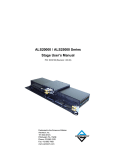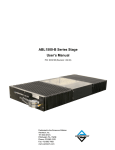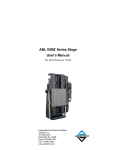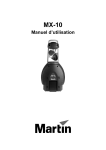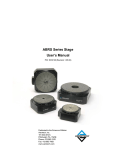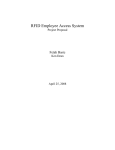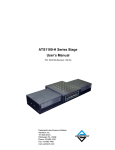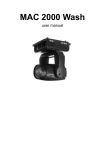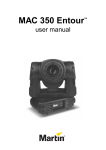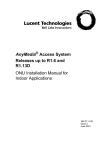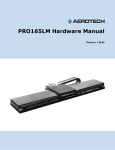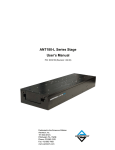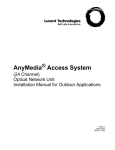Download ALS1000 Series Stage User`s Manual
Transcript
ALS1000 Series Stage User’s Manual P/N: EDS125 (Revision 1.04.00) Dedicated to the Science of Motion Aerotech, Inc. 101 Zeta Drive, Pittsburgh, PA, 15238 Phone: 412-963-7470 Fax: 412-963-7459 www.aerotech.com Product Registration Register online at: http://www.aerotech.com/prodreg.cfm Technical Support United States Headquarters: Phone: (412) 967-6440 Fax: (412) 967-6870 Email: [email protected] United Kingdom: Phone: +44 118 940 9400 Fax: +44 118 940 9401 Email: [email protected] Germany: Phone: +49 911 967 9370 Fax: +49 911 967 93720 Email: [email protected] Japan: Phone: +81(0)47-489-1741 (Sales) Phone: +81(0)47-489-1742 (Service) Fax: +81(0)47-489-1743 Email: [email protected] China: Phone: +852-3793-3488 Email: [email protected] Revision History Revision 1.04.00 February 28, 2011 Revision 1.03.00 March 30, 2010 Revision 1.02.00 May 19, 2009 Revision 1.01.00 October 10, 2007 Revision 1.00.00 April 10, 2007 Product names mentioned herein are used for identification purposes only and may be trademarks of their respective companies. © Aerotech, Inc. 2011 ALS1000 Series Stage User's Manual Table of Contents Table of Contents Table of Contents List of Figures List of Tables iii v vii Chapter 1: Overview 1 1.1. Standard Features 1.1.1. Optional Features 1.1.2. Home Markers 1.1.3. Model Numbers 1.2. Dimensions 1.3. Safety Procedures and Warnings 1.4. EC Declaration of Incorporation Chapter 2: Installation 2.1. Unpacking and Handling the Stage 2.2. Preparing the Mounting Surface 2.3. Securing the Stage to the Mounting Surface 2.4. Attaching the Payload to the Stage 2.5. Electrical Installation 2 3 4 5 7 9 11 13 13 14 16 18 19 Chapter 3: Operating Specifications 21 3.1. Environmental Specifications 3.2. Basic Specifications 3.3. Load Capability 3.4. Magnetic Actuator Limit 3.4.1. Actuator Limit Operation 3.4.2. Limit Switch Wiring 3.5. Standard Motor Wiring 3.6. Vacuum Operation 21 22 25 27 27 27 28 29 Chapter 4: Maintenance 4.1. Service and Inspection Schedule 4.2. Cleaning and Lubrication 4.2.1. Recommended Cleaners and Lubricants 4.2.2. Important Notes on Lubrication 4.2.3. Lubrication and Cleaning Process 31 31 32 32 32 33 Appendix A: Warranty and Field Service 35 Appendix B: Technical Changes 37 Index 39 Reader's Comments 41 www.aerotech.com iii Table of Contents iv ALS1000 Series Stage User's Manual www.aerotech.com ALS1000 Series Stage User's Manual List Of Figures List of Figures Figure 1-1: Figure 1-2: Figure 1-3: Figure 1-4: Figure 1-5: Figure 1-6: Figure 2-1: Figure 2-2: Figure 2-3: Figure 2-4: Figure 3-1: Figure 3-2: Figure 3-3: ALS1000 Series Linear Positioning Stage in an XY Configuration Typical ALS1000 Stage with Callouts ALS1000 Option Example (with a nickel finish) Location of CW and CCW with Reference to Stage Connectors ALS1000 Dimensions ALS1000 XY Dimensions Mounting to a Flat Surface Mounting to a Curve Surface Mounting Hole Locations Reattaching the Hardcover Load Capability of ALS1000 Series Stages Stage Orientations for LVC and LSC Normally Closed (NC) and Normally Open (NO) Limit Switch Wiring www.aerotech.com 1 2 3 4 7 8 14 15 16 17 25 26 27 v List of Figures vi ALS1000 Series Stage User's Manual www.aerotech.com ALS1000 Series Stage User's Manual List of Tables List of Tables Table 1-1: Table 1-2: Table 3-1: Table 3-2: Table 3-3: Table 3-4: Table 3-5: Table B-1: Table B-2: CW and CCW Home Marker Offset from Center of Travel Model Numbering System Environmental Specifications ALS1000 Series Specifications ALS1000 Motor Specifications Feedback and Motor Connector Pin Assignments Limit/Motor Wiring Pin Output Descriptions Current Changes (Revision 1.04.00) Archive of Changes www.aerotech.com 4 5 21 22 24 28 29 37 38 vii List of Tables viii ALS1000 Series Stage User's Manual www.aerotech.com ALS1000 Series Stage User's Manual Overview Chapter 1: Overview This manual describes Aerotech’s ALS1000 series of linear motor positioning stages. Figure 1-1 shows a typical ALS1000 positioning stage. This chapter introduces standard and optional features of the ALS1000 stages, explains the model numbering system, and gives general safety precautions. Figure 1-1: ALS1000 Series Linear Positioning Stage in an XY Configuration N O T E : Aerotech continually improves its product offerings, and listed options may be superseded at any time. Refer to the most recent edition of the Aerotech Motion Control Product Guide for the most current product information at www.aerotech.com. www.aerotech.com Chapter 1 1 Overview ALS1000 Series Stage User's Manual 1.1. Standard Features The ALS1000 is a compact, high-performance stage for use in applications where a small footprint and environmental protection are required. The linear motor is completely cog-free, allowing for extremely tight velocity control. Also, the magnetic field is completely self-contained within the U-channel design. Figure 1-2: 2 Typical ALS1000 Stage with Callouts Chapter 1 www.aerotech.com ALS1000 Series Stage User's Manual Overview 1.1.1. Optional Features In single- and two-axis systems, the Cable Management Systems are completely internal to the stages. However, external CMS is available for three-axis systems. Custom configurations are common and readily available, contact Aerotech for more details. Figure 1-3: www.aerotech.com ALS1000 Option Example (with a nickel finish) Chapter 1 3 Overview ALS1000 Series Stage User's Manual 1.1.2. Home Markers The ALS1000 has three options for Home Marker location: center of the stage (-CM), counterclockwise end of the stage (-CCWM), and clockwise end of the stage (-CWM). These locations are defined with reference to the stage connectors. The counterclockwise end is closest to the stage connectors, and the clockwise end is furthest away from them. Figure 1-4 shows the layout of a stage with a Home Marker in the center of the stage. Figure 1-4: Location of CW and CCW with Reference to Stage Connectors The Home Marker offset distance depends on the size of the stage. Table 1-1 gives the offset distance for the ALS1000 series stages. Table 1-1: 4 CW and CCW Home Marker Offset from Center of Travel Stage ALS10010 Marker Offset from Center (mm) 30 ALS10015 70 ALS10020 70 ALS10030 145 ALS10045 220 ALS10050 237.3 Chapter 1 www.aerotech.com ALS1000 Series Stage User's Manual Overview 1.1.3. Model Numbers The stage model number indicates the optional features on a particular stage. To determine the options on your stage, refer to Table 1-2 for an explanation of the numbering system. Table 1-2: Model Numbering System ALS1000 Series Linear Motor Stage ALS10010 100 mm (4 in) travel stage with linear motor and limits ALS10015 150 mm (6 in) travel stage with linear motor and limits ALS10020 200 mm (8 in) travel stage with linear motor and limits ALS10030 300 mm (12 in) travel stage with linear motor and limits ALS10045 450 mm (18 in) travel stage with linear motor and limits Stage Construction Options /NICKEL Electroless nickel finish (consult factory) Axis Type -S Single axis stage -LXY Lower axis (X) of an ALS1000 XY system -LZ Lower axis (X) of XZ/Θ (2 axis –not ALS1000 upper axis) system -Y Upper axis (Y) of an ALS1000 XY system -YXZ Middle axis (Y) of an XYZ/Θ (3 axis) system Mounting and Grid Pattern -O No tabletop -M Metric dimension mounting pattern and holes (for –S and –Y axis types) -M/CMS For lower axis (X) of XY/Θ (-LZ axis type) and middle axis (Y) of XYZ/Θ (-YXZ axis type) -U English dimension mounting pattern and holes -U/CMS English dimension mounting pattern and holes and CMS Motor -10 Brushless linear motor (BLMC-142-A) Magnet Track -MT Magnet track Linear Encoders -LT10AS Linear encoder for ALS10010; amplified sine output -LT15AS Linear encoder for ALS10015; amplified sine output -LT20AS Linear encoder for ALS10020; amplified sine output -LT30AS Linear encoder for ALS10030; amplified sine output -LT45AS Linear encoder for ALS10045; amplified sine output -LT10X5 Linear encoder for ALS10010; 1.0 micron line driver output -LT15X5 Linear encoder for ALS10015; 1.0 micron line driver output -LT20X5 Linear encoder for ALS10020; 1.0 micron line driver output -LT30X5 Linear encoder for ALS10030; 1.0 micron line driver output -LT45X5 Linear encoder for ALS10045; 1.0 micron line driver output www.aerotech.com Chapter 1 5 Overview ALS1000 Series Stage User's Manual Table 1-2: Model Numbering System (continued) Linear Encoders -LT10X50 Linear encoder for ALS10010; 0.1 micron line driver output -LT15X50 Linear encoder for ALS10015; 0.1 micron line driver output -LT20X50 Linear encoder for ALS10020; 0.1 micron line driver output -LT30X50 Linear encoder for ALS10030; 0.1 micron line driver output -LT45X50 Linear encoder for ALS10045; 0.1 micron line driver output Limits -NC Normally-closed end of travel and home limit switches (standard) Options -P1 Air purge for –S (single axis) or –LXY (lower axis of XY) -P1/Y Air purge for –Y (upper axis of XY) -X-CMS External cable management system for lower axis Home Marker Location -CM Home marker located at the center of the stage -CCWM Home marker located at the counterclockwise end of the stage -CWM Home marker located at the clockwise end of the stage Accessories (to be ordered as separate line item) ALIGNMENT-NPA Non-precision XY assembly ALIGNMENT-PA10 XY assembly; 10 arc sec orthogonal ALIGNMENT-PA15 XY assembly; 5 arc sec orthogonal HALAR High-accuracy system, linear error correction for accuracy and repeatability MXH5-D-mm* External 20-times multiplier; 32 MHz maximum data rate, 1.0 um resolution (LTAS) MXH10-D-mm* External 40-times multiplier; 32 MHz maximum data rate, 0.5 um resolution (LTAS) MXH25-D-mm* External 100-times multiplier; 32 MHz maximum data rate, 0.2 um resolution (LTAS) MXH50-D-mm* External 200-times multiplier; 32 MHz maximum data rate, 0.1 um resolution (LTAS) MXH100-D-mm* External 400-times multiplier; 32 MHz maximum data rate, 0.05 um resolution (LTAS) MXH200-D-mm* External 800-times multiplier; 32 MHz maximum data rate, 0.025 um resolution (LTAS) MXH250-D-mm* External 1000-times multiplier; 32 MHz maximum data rate, 0.02 um resolution (LTAS) MXH500-D-mm* External 2000-times multiplier; 32 MHz maximum data rate, 0.01 um resolution (LTAS) MXC-nn Multiplier to controller cable; specify length ‘-nn’ in feet * Specify data rate “mm” 2M = 2MHz, 4M = 4MHz, 8M = 8MHz, 16M = 16MHz, 32M = 32MHz N O T E : Internal signal multipliers available with A3200 amplifier products 6 Chapter 1 www.aerotech.com ALS1000 Series Stage User's Manual Overview 1.2. Dimensions Figure 1-5: www.aerotech.com ALS1000 Dimensions Chapter 1 7 Overview ALS1000 Series Stage User's Manual Figure 1-6: 8 ALS1000 XY Dimensions Chapter 1 www.aerotech.com ALS1000 Series Stage User's Manual Overview 1.3. Safety Procedures and Warnings The following statements apply throughout this manual. Failure to observe these precautions could result in serious injury to those performing the procedures and damage to the equipment. This manual and any additional instructions included with the stage should be retained for the lifetime of the stage. To minimize the possibility of electrical shock and bodily injury or death, disconnect all electrical power prior to making any electrical connections. To minimize the possibility of electrical shock and bodily injury or death when any electrical circuit is in use, ensure that no person comes in contact with the circuitry when the stage is connected to a power source. To minimize the possibility of bodily injury or death, disconnect all electrical power prior to making any mechanical adjustments. Moving parts of the stage can cause crushing or shearing injuries. All personnel must remain clear of any moving parts. Improper use of the stage can cause damage, shock, injury, or death. Read and understand this manual before operating the stage. If the stage is used in a manner not specified by the manufacturer, the protection provided by the stage can be impaired. Stage cables can pose a tripping hazard. Securely mount and position all stage cables to avoid potential hazards. www.aerotech.com Chapter 1 9 Overview ALS1000 Series Stage User's Manual Do not expose the stage to environments or conditions outside the specified range of operating environments. Operation in conditions other than those specified can cause damage to the equipment. The stage must be mounted securely. Improper mounting can result in injury and damage to the equipment. Use care when moving the stage. Manually lifting or transporting stages can result in injury. Only trained personnel should operate, inspect, and maintain the stage. This stage is intended for light industrial manufacturing or laboratory use. Use of the stage for unintended applications can result in injury and damage to the equipment. Before using this stage, perform an operator risk assessment to determine the needed safety requirements. 10 Chapter 1 www.aerotech.com ALS1000 Series Stage User's Manual Overview 1.4. EC Declaration of Incorporation Manufactorer: Aerotech, Inc. 101 Zeta Drive Pittsburgh, PA 15238 USA herewith declares that the product: Aerotech, Inc. ALS1000 Stage is intended to be incorporated into machinery to constitute machinery covered by the Directive 2006/42/EC as amended; does therefore not in every respect comply with the provisions of this directive; and that the following harmonized European standards have been applied: EN ISO 12100-1,-2:2003+A1:2009 Safety of machinery - Basic concepts, general principles for design ISO 14121-1:2007 Safety of machinery - Risk assessment - Par 1: Principles EN 60204-1:2005 Safety of machinery - Electrical equipment of machines - Part 1: General requirements and further more declares that it is not allowed to put the equipment into service until the machinery into which it is to be incorporated or of which it is to be a component has been found and declared to be in conformity with the provisions of the Directive 2006/42/EC and with national implementing legislation, i.e. as a whole, including the equipment referred to in this Declaration. Authorized Representative: Address: Manfred Besold AEROTECH GmbH Süd-West-Park 90 D-90449 Nürnberg Name: Position: Location: Date: www.aerotech.com Alex Weibel / Engineer Verifying Compliance Pittsburgh, PA February 28, 2011 Chapter 1 11 Overview 12 ALS1000 Series Stage User's Manual Chapter 1 www.aerotech.com ALS1000 Series Stage User's Manual Installation Chapter 2: Installation This chapter describes the installation procedure for the ALS1000 stage, including handling the stage properly, preparing the mounting surface to accept the stage, securing the stage to the mounting surface, attaching the payload, and making the electrical connections. Installation must follow the instructions in this chapter. Failure to follow these instructions could result in injury and damage to the equipment. 2.1. Unpacking and Handling the Stage Carefully remove the stage from the protective shipping container. Set the stage on a smooth, flat, and clean surface. Before operating the stage, it is important to let the stage stabilize at room temperature. All ALS1000 series stages are packaged with shipping clamps installed to prevent stage table movement. These are red anodized brackets (the only red anodized pieces Aerotech uses) that bolt the stage table to the base. These must be removed before the stage table can be moved. For the ALS1000 series, these shipping clamps are internal to the stage. The hardcover must be removed to access the shipping clamps (see Section 2.3). Each stage has a label listing the system part number and serial number. These numbers contain information necessary for maintaining or updating system hardware and software. Locate this label and record the information for later reference. If any damage has occurred during shipping, report it immediately. Improper stage handling could adversely affect the stage’s performance. Use care when moving the stage. Manually lifting or transporting stages can result in injury. Lift the stage only by the base. Do not use the stage table as a lifting point. www.aerotech.com Chapter 2 13 Installation ALS1000 Series Stage User's Manual 2.2. Preparing the Mounting Surface The mounting surface should be flat and have adequate stiffness in order to achieve the maximum performance from the stage. When an ALS1000 series stage is mounted to a non-flat surface, the stage can be distorted as the mounting screws are tightened (see Figure 2-1 and Figure 2-2). Figure 2-1: Mounting to a Flat Surface N O T E : To maintain accuracy, the mounting surface should be flat within 1µm per 50mm. Any distortion will decrease the overall accuracy of the stage. Adjustments to the mounting surface must be done before the stage is secured (see Figure 2-2). 14 Chapter 2 www.aerotech.com ALS1000 Series Stage User's Manual Figure 2-2: Installation Mounting to a Curve Surface N O T E : The stage housing is precision machined and verified for flatness prior to stage assembly at the factory. If necessary, machining should be performed on the mounting surface rather than the stage housing to achieve a required flatness. Shimming should be avoided if possible. Shimming decreases the rigidity of the system. www.aerotech.com Chapter 2 15 Installation ALS1000 Series Stage User's Manual 2.3. Securing the Stage to the Mounting Surface To access the mounting holes of the stage, the hardcover must be removed. Four screws, two at each end of the stage, retain the hardcover (see Figure 2-3). Remove the screws and slide the hardcover out from under the table. If necessary, manually move the stage table to access the counter-bored mounting holes along the edges of the stage. The stage is designed to use socket head cap screws (SHCS) to secure the base to the mounting surface. Use M6 x 18 mm or ¼ x 7/8” long SHCS with flat washers to 1.5x diameter thread engagement. Torque the mounting screws to 8.1 N*m (6 ft*lb). The stage must be mounted securely. Improper mounting can result in injury and damage to the equipment. Figure 2-3: 16 Mounting Hole Locations Chapter 2 www.aerotech.com ALS1000 Series Stage User's Manual Installation Once the stage has been secured to the mounting surface, the hardcover must be reattached. Take special care to reattach the hardcover in the same orientation as it was removed (align the adhesive strip on the underside of the hardcover with the blue ribbon cable within the stage). Furthermore, before tightening the screws, center the hardcover on the stage. Once the hardcover is tightened down, manually run the stage through travel. Check to make sure there is no increased friction or noise. If either of these occur, loosen the screws and re-center the hardcover. Repeat as necessary until the stage runs smoothly through travel. Figure 2-4: www.aerotech.com Reattaching the Hardcover Chapter 2 17 Installation ALS1000 Series Stage User's Manual 2.4. Attaching the Payload to the Stage To prevent damage to delicate payloads, test the operation of the stage before attaching the payload to the stage table. Proceed with the electrical installation and test the motion control system in accordance with the system documentation. Document all results for future reference. For information on electrical connections, refer to Section 2.5. Electrical Installation. The payload should be flat, rigid, and comparable to the stage in quality. N O T E : For valid accuracies, the mounting interface should be flat within 10 µm. Refer to Section 3.3. for information on cantilevered loads and load positioning. N O T E : Do not attach a payload to the stage table with screws that are too long. A screw passing through the stage table can come into contact with the hardcover, affecting travel and possibly damaging the stage. 18 Chapter 2 www.aerotech.com ALS1000 Series Stage User's Manual Installation 2.5. Electrical Installation Electrical installation requirements will vary depending on stage options. Installation instructions in this section are for stages equipped with standard Aerotech motors intended for use with an Aerotech motion control system. Contact Aerotech for further information regarding stages that are otherwise configured. Aerotech motion control systems are adjusted at the factory for optimum performance. When the ALS1000 series stage is part of a complete Aerotech motion control system, setup involves connecting a stage and motor combination to the appropriate drive chassis with the cables provided. Connect the provided cables to the motor and feedback connectors on the stage. Labels on the drive indicate the appropriate connections. Refer to your drive manuals and documentation for additional installation and operation information. In some cases, if the system is uniquely configured, a drawing showing system interconnects is supplied. An integral linear motor comes mounted to all ALS1000 stages. The electrical wiring from the motor and encoder are integrated into two main connectors at the factory. Refer to Section 3.5. for standard motor wiring and connector pin outputs. Never connect or disconnect any electrical component or connecting cable while power is applied, or serious damage may result. The stage's protective ground is located on pin A4 of the motor connector. If you are using cables other than those provided by Aerotech to connect the motor to the drive, you must connect pin A4 to a ground connection. www.aerotech.com Chapter 2 19 Installation 20 ALS1000 Series Stage User's Manual Chapter 2 www.aerotech.com ALS1000 Series Stage User's Manual Operating Specifications Chapter 3: Operating Specifications The surrounding environment and operating conditions can affect the performance and service life of the stage. This chapter provides information on ideal environmental and operating conditions. Also included are instructions for estimating load capability given various loading situations. 3.1. Environmental Specifications The environmental specifications for the ALS1000 are listed in the following table. Table 3-1: Environmental Specifications Ambient Temperature Operating: 10° to 35° C (50° to 95° F) The optimal operating temperature is 20° C ±2° C (68° F ±4° F). If at any time the operating temperature deviates from 20° C degradation in performance could occur. Contact Aerotech for information regarding your specific application and environment. Storage: 0° to 40° C (32° to 104° F) in original shipping packaging Humidity Operating: 40 percent to 60 percent RH The optimal operating humidity is 50 percent RH. Storage: 30 percent to 60 percent RH, non-condensing in original packaging Altitude Operating: 0 to 2,000 m (0 to 6,562 ft) above sea level Contact Aerotech if your specific application involves use above 2,000 m or below sea level. Vibration Use the system in a low vibration environment. Excessive floor or acoustical vibration can affect stage and system performance. Contact Aerotech for information regarding your specific application. Dust Exposure The ALS1000 stages have limited protection against dust, but not water. This equates to an ingress protection rating of IP50. Use Indoor use only Do not expose the stage to environments or conditions outside the specified range of operating environments. Operation in conditions other than those specified can cause damage to the equipment. www.aerotech.com Chapter 3 21 Operating Specifications ALS1000 Series Stage User's Manual 3.2. Basic Specifications Basic ALS1000 series positioning stage specifications are shown in Table 3-2. Motor specifications are listed in Table 3-3. Table 3-2: ALS1000 Series Specifications Basic Model Total Travel ALS10010 100 mm (4in) Drive System ALS10015 150 mm (6in) Linear Brushless Servomotor (BLMC-142-A) Feedback Noncontact Linear Encoder Resolution (LT) 0.005 µm - 1.0 µm (0.2 µin - 40 µin) Maximum Travel Speed 750 mm/s (30 in/s) Maximum Linear Acceleration Maximum Load 2 g - 20 m/s2 (787 in/s2) (no load) Horizontal 50.0 kg (110 lb) Side 25.0 kg (55 lb) Continuous Stall Force 73.4 N (16.5 lb) Peak Force 458.0 N (103 lb) HALAR Acuracy (LT) ±1.0 µm (±40 µin) ±4.0 µm (±160 µin) Standard ±6.0 µm (±240 µin) Repeatability (LT) Straightness and Flatness ALS10020 200 mm (8 in) ±8.0 µm (±320 µin) ±1.0 µm (±40 µin) Differential Maximum Deviation 3.0 µm/25 mm (120 µin/in) ±2.4 µm (±96 µin) ±3.6 µm (±144 µin) ±4.8 µm (±192 µin) 6 arc sec 9 arc sec 12 arc sec 8.4 kg (18.4 lb) 10.0 kg (22.0 lb) 11.0 kg (24.2 lb) Pitch and Yaw Nominal Stage Weight Construction Aluminum Body/Black Anodize Finish/Hardcoat • All performance specifications are measured on a single axis basis. • Repeatability and accuracy include linearity correction and minimum thermal change during measurement. • Vertical and axial loads subject to cantilever load restriction. • Selected motor and drive will limit performance specifications. • Consult factory for XY and alternate mounting configurations. 22 Chapter 3 www.aerotech.com ALS1000 Series Stage User's Manual Operating Specifications Table 3-2: ALS1000 Series Specifications (continued) Basic Model Total Travel ALS10030 300 mm (12 in) Drive System Linear Brushless Servomotor (BLMC-142-A) Feedback Noncontact Linear Encoder Resolution (LT) 0.005 µm - 1.0 µm (0.2 µin - 40 µin) Maximum Travel Speed 750 mm/s (30 in/s) Maximum Linear Acceleration Maximum Load ALS10045 450 mm (18 in) 2 g - 20 m/s2 (787 in/s2) (no load) Horizontal 50.0 kg (110 lb) Side 25.0 kg (55 lb) Continuous Stall Force 73.4 N (16.5 lb) Peak Force 458.0 N (103 lb) Accuracy (LT) HALAR ±1.0 µm (±40 µin) Standard ±12.0 µm (±480 µin) Repeatability (LT) Straightness and Flatness ±18.0 µm (±720 µin) ±1.0 µm (±40 µin) Differential 3.0 µm/25 mm (120 µin/in) Maximum Deviation ±7.2 µm (±288 µin) Pitch and Yaw Nominal Stage Weight Construction ±10.8 µm (±432 µin) 16 arc sec 20 arc sec 13.1 kg (28.8 lb) 16.0 kg (35.2 lb) Aluminum Body/Black Anodize Finish/Hardcoat • All performance specifications are measured on a single axis basis. • Repeatability and accuracy include linearity correction and minimum thermal change during measurement. • Vertical and axial loads subject to cantilever load restriction. • Selected motor and drive will limit performance specifications. • Consult factory for XY and alternate mounting configurations. www.aerotech.com Chapter 3 23 Operating Specifications Table 3-3: ALS1000 Series Stage User's Manual ALS1000 Motor Specifications Model Winding Designation Performance Specifications (1,5) BLMC-142 -A Continuous Force, 20 psi, 1.4 bar (2) Continuous Force, No Cooling, (2) Peak Force (3) Electrical Specifications 120.3 lb 27.0 N 77.7 lb 17.5 N 481.2 lb 108.2 V / m / sec 21.28 V / in / sec 0.54 (5) BEMF Constant (line to line, max) Continuous Current, 20 psi, 1.4 bar (2) Continuous Current, No Cooling Peak Current, Stall N (2) (3) Force Constant, Sinusoidal Drive (4,8) Motor Constant (2,4) Resistance, 25 °C (line to line) Inductance (line to line) A, pk 6.50 A, rms 4.60 A, pk 4.20 A, rms 2.97 A, pk 26.00 A, rms 18.38 N / A, pk 18.51 lb / A, pk 4.16 N / A, rms 26.17 lb / A, rms 5.88 N / √W 8.24 lb / √W 1.85 Ohms 4.8 mH 1.33 Thermal Resistance, 20 psi, 1.4 bar °C / W 0.47 Thermal Resistance, No Cooling °C / W 1.12 VDC 340 Maximum Bus Voltage (1) Performance is dependent upon heat sink configuration, system cooling conditions, and ambient temperature (2) Values shown @ 100 °C rise above a 25 °C ambient temperature, with motor mounted to the specified aluminum heat sink (3) Peak force assumes correct rms current, consult Aerotech (4) Force Constant and Motor Constant specified at stall (5) All performance and electrical specifications +/- 10% (6) Maximum winding temperature is 125 °C (7) Ambient operating temperature range: 0 °C - 25 °C, consult Aerotech for performance in elevated ambient temperatures (8) All Aerotech amplifiers are rated Apk; use torque constant in N-m / Apk when sizing 24 Chapter 3 www.aerotech.com ALS1000 Series Stage User's Manual Operating Specifications 3.3. Load Capability It is recommended that application loads be symmetrically distributed whenever possible (i.e., the payload should be centered on the stage table and the entire stage should be centered on the support structure). With the stage lying flat (horizontal) and the application load vertically applied and symmetrically distributed, the maximum vertical load carrying capacity of ALS1000 stages is 50.0 kg. If cantilevered loads are applied, refer to Figure 3-1 to find the maximum allowable load. In Figure 3-1, two curves are shown for different loading conditions. The Lvc or “vertical cantilever” curve is for situations where the stage is mounted in a vertical orientation and the payload is mounted to the table top with its center of gravity extended outward. The Lsc or “side cantilever” curve assumes a horizontal stage orientation. If a cantilevered load situation is used, first determine if it is a vertical cantilever or side cantilever system based on Figure 3-2. Measure the cantilever length, then find the corresponding load value from Figure 3-1. Figure 3-1: www.aerotech.com Load Capability of ALS1000 Series Stages Chapter 3 25 Operating Specifications Figure 3-2: 26 ALS1000 Series Stage User's Manual Stage Orientations for L VC and LSC Chapter 3 www.aerotech.com ALS1000 Series Stage User's Manual Operating Specifications 3.4. Magnetic Actuator Limit 3.4.1. Actuator Limit Operation Each actuator limit has a magnet which is detected by the encoder read head. Each actuator is mounted at the ends of the stage table perpendicular to the direction of table motion. When movement of the stage table detects the magnet, a limit signal is generated. The actuator limit output is active high. If the stage is driven 8 mm beyond the electrical limit, it will encounter the mechanical stop. Although the operating speed of the stage may be relatively slow, damage to the stage could result. 3.4.2. Limit Switch Wiring Limit switches are open-collector, TTL–compatible devices powered by 5 Volts that change output states when the stage approaches its maximum travel distance. Since they are open-collector devices, they may be interfaced to 24V logic inputs. Each limit is glued to the stage base near the scale. Standard ALS1000 stages include limit wiring integrated into one of the two main connectors. With a NC limit configuration, the input to the controller is seen as a logic 0 (typical 0.4 V @ 12.8 mA) when no limit condition is present. When the limit is activated, a 5 V source through a pull-up resistor causes a logic 1 (typically 4.8-5 V) to be seen by the controller input. See Figure 3-3 for a diagram of limit switch wiring. Figure 3-3: www.aerotech.com Normally Closed (NC) and Normally Open (NO) Limit Switch Wiring Chapter 3 27 Operating Specifications ALS1000 Series Stage User's Manual 3.5. Standard Motor Wiring Stages fitted with standard motors and encoders come from the factory completely wired and assembled. For reference, connector pin assignments and general wiring information is given in the following figures. Pin assignements are defined in Table 3-5. N O T E : Refer to the other documentation accompanying your Aerotech equipment. Call your Aerotech representative if there are any questions on system configuration. N O T E : If you are using your own cables to connect the stage, ensure that motor and ground wires can handle current higher than the continuous current listed in Table 3-3. The voltage rating of the wire insulation must be greater than the bus voltage listed in Table 3-3. Table 3-4: Pin 28 Feedback and Motor Connector Pin Assignments Description Pin Description 1 SIG SHLD 14 COS 2 N.C. 15 COS-N 3 ENC +5V 16 LMT +5V 4 N.C. 17 SIN 5 Hall B 18 SIN-N 6 MKR-N 19 RESERVED 7 MKR 20 Limit Common 8 N.C. 21 Encoder Common 9 N.C. 22 N.C. 10 Hall A 23 N.C. 11 Hall C 24 -LMT 12 +LMT 25 Reserved 13 RESERVED Pin Description Pin Description A1 MTR ØA 3 RESERVED A2 MTR ØB 4 RESERVED A3 MTR ØC 5 RESERVED 1 MTR SHLD 2 RESERVED A4 Chapter 3 FRMGND www.aerotech.com ALS1000 Series Stage User's Manual Table 3-5: Operating Specifications Limit/Motor Wiring Pin Output Descriptions Pin Output + LMT Description Active high signal indicating maximum travel produced by positive stage direction. COS Cosine. Incremental encoder output; either TTL line driven or amplified sine wave type signal. COS-N Incremental encoder output. Complement of cos. - LMT Active high signal indicating stage maximum travel produced by negative stage direction. ENC +5V +5 V supply input for optical encoders. Typical requirement is 250 mA. Hall A Hall Effect A. Brushless motor commutation track output. Hall B Hall Effect B. Brushless motor commutation track output. Hall C Hall Effect C. Brushless motor commutation track output. LMT +5V + 5 V supply input for optical limit switch boards. Typical requirement is 50 mA. MKR Marker. MKR-N Incremental encoder output; either the complement of Marker with a line driven, TTL type encoder or 2.5 VDC bias level with amplified sine wave type encoder. MTR ØA Motor Phase A. MTR ØB Motor Phase B. MTR ØC Motor Phase C. RESERVED Not used. SIG SHLD Feedback connector shield. SIN Sine. Incremental encoder output; either TTL line driven or amplified sign wave type signal. SIN-N Incremental encoder output. Complement of sin. SIG COM Common ground for feedback connector wiring. MTR SHLD Shield for motor connector wiring. FRM GND Motor common ground. 3.6. Vacuum Operation Contact the factory for information regarding operation in a vacuum environment. www.aerotech.com Chapter 3 29 Operating Specifications 30 ALS1000 Series Stage User's Manual Chapter 3 www.aerotech.com ALS1000 Series Stage User's Manual Maintenance Chapter 4: Maintenance This chapter will cover information about intervals between lubrications, detail the lubrication and inspection process, and cover which lubricants are recommended for use. Also included is a section on belt tension and adjustment on stages with the foldback option. N O T E : The bearing area must be kept free of foreign matter and moisture; otherwise, the performance and life expectancy of the stage will be reduced. To minimize the possibility of bodily injury, confirm that all electrical power is disconnected prior to making any mechanical adjustments. 4.1. Service and Inspection Schedule Lubricant inspection and replenishment in ALS1000 series stages depends on conditions such as duty cycle, speed, and the environment. An inspection interval of once per month is recommended until a trend develops for the application. Longer or shorter intervals may be required to maintain the film of lubricant on the bearing surfaces. In general, it is recommended that stages operating in a clean environment be lubricated annually, or 500 km, whichever comes first. For stages operating under conditions involving excessive debris, lubrication every six months is recommended. If the application process uses only a small portion of travel for most of the duty cycle, it is recommended that the stage be periodically driven through full travel to redistribute the lubrication in the bearings. The motor is completely non-contact and requires no lubrication. www.aerotech.com Chapter 4 31 Maintenance ALS1000 Series Stage User's Manual 4.2. Cleaning and Lubrication 4.2.1. Recommended Cleaners and Lubricants For standard linear bearing guide rails, NSK LGU grease is recommended. If a solvent is necessary for cleaning the stage, it is recommended that isopropyl alcohol be used. Harsher solvents, such as acetone, may damage the plastic and rubber seals on the linear bearing trucks. If acetone is required, avoid the bearing seals. For high-speed applications (i.e., near maximum speed at a duty cycle of 50%), frequent maintenance with standard lubricants is required. 4.2.2. Important Notes on Lubrication When cleaning and/or lubricating components of the ALS1000 series stages: 1. Be sure to use a clean, dry, soft, and lint–free cloth for cleaning. 2. Take the opportunity during the lubrication procedure to inspect the linear motion guides for any damage or signs of wear. 3. In applications that have multiple stages bolted together to form multi axis systems, the orthogonality may be lost if the stage tables of the support stages are loosened. Precision aligned stages should not be loosened or disassembled. 32 Chapter 4 www.aerotech.com ALS1000 Series Stage User's Manual Maintenance 4.2.3. Lubrication and Cleaning Process The lubrication and cleaning process is outlined in the steps that follow. 1. Drive the stage table to one end of travel and remove power to the stage. 2. Remove the screws on the edges of the hard cover (as shown in Section 2.3. ) and slide it out from under the stage. 3. Remove any accumulated dust or debris from the inside of the assembly. 4. Remove any dirty or dried lubricant from the linear bearing rails. Use a clean, lint-free cloth with a side-toside motion. A swab soaked in Isopropyl Alcohol may be used to remove stubborn debris. 5. Apply a thin, continuous film of lubricant to the linear bearing guides. A good quality, natural bristle artist's brush makes an excellent applicator. 6. Manually move the stage to the opposite end of travel. This will work the grease into the linear bearing guides. The stage table should move freely with little resistance. 7. Repeat steps 3 through 5 for any areas covered by the original table position. 8. Refasten the hardcover. 9. Restore power to the stage and drive the stage table back to its original position to redistribute lubricants. To minimize the possibility of bodily injury, confirm that all electrical power is disconnected prior to making any mechanical adjustments. www.aerotech.com Chapter 4 33 Maintenance 34 ALS1000 Series Stage User's Manual Chapter 4 www.aerotech.com ALS1000 Series Stage User's Manual Warranty and Field Service Appendix A: Warranty and Field Service Aerotech, Inc. warrants its products to be free from defects caused by faulty materials or poor workmanship for a minimum period of one year from date of shipment from Aerotech. Aerotech's liability is limited to replacing, repairing or issuing credit, at its option, for any products that are returned by the original purchaser during the warranty period. Aerotech makes no warranty that its products are fit for the use or purpose to which they may be put by the buyer, where or not such use or purpose has been disclosed to Aerotech in specifications or drawings previously or subsequently provided, or whether or not Aerotech's products are specifically designed and/or manufactured for buyer's use or purpose. Aerotech's liability or any claim for loss or damage arising out of the sale, resale or use of any of its products shall in no event exceed the selling price of the unit. Aerotech, Inc. warrants its laser products to the original purchaser for a minimum period of one year from date of shipment. This warranty covers defects in workmanship and material and is voided for all laser power supplies, plasma tubes and laser systems subject to electrical or physical abuse, tampering (such as opening the housing or removal of the serial tag) or improper operation as determined by Aerotech. This warranty is also voided for failure to comply with Aerotech's return procedures. Laser Products Claims for shipment damage (evident or concealed) must be filed with the carrier Return Procedure by the buyer. Aerotech must be notified within (30) days of shipment of incorrect materials. No product may be returned, whether in warranty or out of warranty, without first obtaining approval from Aerotech. No credit will be given nor repairs made for products returned without such approval. Any returned product(s) must be accompanied by a return authorization number. The return authorization number may be obtained by calling an Aerotech service center. Products must be returned, prepaid, to an Aerotech service center (no C.O.D. or Collect Freight accepted). The status of any product returned later than (30) days after the issuance of a return authorization number will be subject to review. After Aerotech's examination, warranty or out-of-warranty status will be determined. If upon Aerotech's examination a warranted defect exists, then the product(s) will be repaired at no charge and shipped, prepaid, back to the buyer. If the buyer desires an airfreight return, the product(s) will be shipped collect. Warranty repairs do not extend the original warranty period. Returned Product Warranty Determination After Aerotech's examination, the buyer shall be notified of the repair cost. At such Returned Product time, the buyer must issue a valid purchase order to cover the cost of the repair and Non-warranty Deterfreight, or authorize the product(s) to be shipped back as is, at the buyer's mination expense. Failure to obtain a purchase order number or approval within (30) days of notification will result in the product(s) being returned as is, at the buyer's expense. Repair work is warranted for (90) days from date of shipment. Replacement components are warranted for one year from date of shipment. At times, the buyer may desire to expedite a repair. Regardless of warranty or outof-warranty status, the buyer must issue a valid purchase order to cover the added rush service cost. Rush service is subject to Aerotech's approval. www.aerotech.com Appendix A Rush Service 35 Warranty and Field Service ALS1000 Series Stage User's Manual On-site Warranty If an Aerotech product cannot be made functional by telephone assistance or by Repair sending and having the customer install replacement parts, and cannot be returned to the Aerotech service center for repair, and if Aerotech determines the problem could be warranty-related, then the following policy applies: Aerotech will provide an on-site field service representative in a reasonable amount of time, provided that the customer issues a valid purchase order to Aerotech covering all transportation and subsistence costs. For warranty field repairs, the customer will not be charged for the cost of labor and material. If service is rendered at times other than normal work periods, then special service rates apply. If during the on-site repair it is determined the problem is not warranty related, then the terms and conditions stated in the following "On-Site Non-Warranty Repair" section apply. On-site Non-warranty If any Aerotech product cannot be made functional by telephone assistance or purRepair chased replacement parts, and cannot be returned to the Aerotech service center for repair, then the following field service policy applies: Aerotech will provide an on-site field service representative in a reasonable amount of time, provided that the customer issues a valid purchase order to Aerotech covering all transportation and subsistence costs and the prevailing labor cost, including travel time, necessary to complete the repair. Company Address Aerotech, Inc. 101 Zeta Drive Pittsburgh, PA 15238-2897 36 Phone: (412) 963-7470 Fax: (412) 963-7459 Appendix A www.aerotech.com ALS1000 Series Stage User's Manual Technical Changes Appendix B: Technical Changes Table B-1: Current Changes (Revision 1.04.00) Section Section 1.4. Change Added section Section 3.1. Added section Chapter 2: Installation, Section 2.1. , Section 2.3. , Section 2.5. , and Section 1.3. Changed base width to 5.95" from 6.00" Section 3.2. Added motor specifications Section 3.5. Added note about motor wire current and voltage requirements www.aerotech.com Appendix B 37 Technical Changes Table B-2: ALS1000 Series Stage User's Manual Archive of Changes Version 1.00.00 Section All Change New manual 1.01.00 Section 2.3. Directions for reattaching the hardcover expanded 1.02.00 Section 1.2. Added Dimensions section 1.02.00 Section 1.1.2. Added Home Marker section 1.02.00 Section 1.1.3. Added Home Marker option to Model Numbering 1.03.00 Section 1.2. Changed base width to 5.95" from 6.00" 38 Appendix B www.aerotech.com Index ALS1000 Series Stage User's Manual Index S A Attaching the Payload 18 C cable safety procedures 9 Service schedule 31 stage table 16 Standard Features 2 19 U D Declaration of Incorporation Dimensions Unpacking and Handling the Stage W 7 Warnings E Electrical Installation 13 11 wiring 9 19, 27 19 encoders 19, 28 Environmental Specifications 21 I Inspection schedule 31 L limit switches 27 lubricants recomended 32 Lubrication and Cleaning 33 Lubrication schedule 31 M model numbers 6, 13 motors 19 multiaxis combinations 32 O Operating Specifications 21 P Preparing the Mounting Surface www.aerotech.com 14 Index 39 ALS1000 Series Stage User's Manual 40 Index Index www.aerotech.com Reader's Comments ALS1000 Series Stage Manual P/N: EDS125, February 28, 2011 Revision 1.04.00 Please answer the questions below and add any suggestions for improving this document. Is the manual: Yes No Adequate to the subject Well organized Clearly presented Well illustrated How do you use this document in your job? Does it meet your needs? What improvements, if any, would you like to see? Please be specific or cite examples. Stage/Product Details Name Model # Title Serial # Company Name Date Shipped Address Customer Order # Aerotech Subsidiary Order # Email Mail your comments to: Fax to: Aerotech, Inc. 101 Zeta Drive Pittsburgh, PA 15238 U.S.A. 412-967-6870 Email: [email protected]



















































